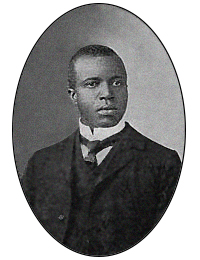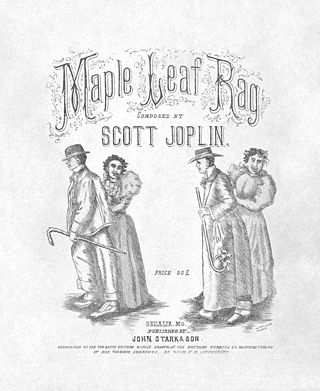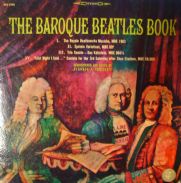Ragtime, also spelled rag-time or rag time, is a musical style that had its peak from the 1890s to 1910s. Its cardinal trait is its syncopated or "ragged" rhythm. Ragtime was popularized during the early 20th century by composers such as Scott Joplin, James Scott and Joseph Lamb. Ragtime pieces are typically composed for and performed on piano, though the genre has been adapted for a variety of instruments and styles.

Scott Joplin was an American composer and pianist. Dubbed the "King of Ragtime", he composed more than 40 ragtime pieces, one ragtime ballet, and two operas. One of his first and most popular pieces, the "Maple Leaf Rag", became the genre's first and most influential hit, later being recognized as the quintessential rag. Joplin considered ragtime to be a form of classical music meant to be played in concert halls and largely disdained the performance of ragtime as honky tonk music most common in saloons.

The Sting is a 1973 American caper film set in September 1936, involving a complicated plot by two professional grifters to con a mob boss. The film was directed by George Roy Hill, who had previously directed Newman and Redford in the Western Butch Cassidy and the Sundance Kid (1969), and written by screenwriter David S. Ward, inspired by real-life cons perpetrated by brothers Fred and Charley Gondorff and documented by David Maurer in his 1940 book The Big Con: The Story of the Confidence Man.

Joseph Francis Lamb was an American composer of ragtime music. Lamb, of Irish descent, was the only non-African American of the "Big Three" composers of classical ragtime, the other two being Scott Joplin and James Scott. The ragtime of Joseph Lamb ranges from standard popular fare to complex and highly engaging. His use of long phrases was influenced by classical works he had learned from his sister and others while growing up, but his sense of structure was potentially derived from his study of Joplin's piano rags. By the time he added some polish to his later works in the 1950s, Lamb had mastered the classic rag genre in a way that almost no other composer was able to approach at that time, and continued to play it passably as well, as evidenced by at least two separate recordings done in his home, as well as a few recorded interviews.

William Elden Bolcom is an American composer and pianist. He has received the Pulitzer Prize, the National Medal of Arts, a Grammy Award, the Detroit Music Award and was named 2007 Composer of the Year by Musical America. He taught composition at the University of Michigan from 1973 until 2008. He is married to mezzo-soprano Joan Morris.

The "Maple Leaf Rag" is an early ragtime musical composition for piano composed by Scott Joplin. It was one of Joplin's early works, becoming the model for ragtime compositions by subsequent composers. It is one of the most famous of all ragtime pieces. Its success led to Joplin being dubbed the "King of Ragtime" by his contemporaries. The piece gave Joplin a steady if unspectacular income for the rest of his life.

Nonesuch Records is an American record company and label owned by Warner Music Group, distributed by Warner Records, and based in New York City. Founded by Jac Holzman in 1964 as a budget classical label, Nonesuch has developed into a label that records critically acclaimed music from a wide range of genres. Robert Hurwitz was president of the company from 1984 to 2017.

Kicking Mule Records was an American independent record label, founded in Berkeley, California in 1971 by guitarist Stefan Grossman and Eugene "ED" Denson, formerly co-owner of Takoma Records. The company's name comes from the country blues sexual two-timing allegory "there's another mule kicking in your stall".

Classic rag is the style of ragtime composition pioneered by Scott Joplin and the Missouri school of ragtime composers. These compositions were first considered "classic" by Joplin's publisher, John Stark, as a way to distinguish them from what he considered the "common" rags of other publishers. Today, any composition fitting this particular ragtime structural form is considered classic rag.

"The Entertainer" is a 1902 classic piano rag written by Scott Joplin.
Joshua Rifkin is an American conductor, pianist, and musicologist. He is currently a professor of music at Boston University. As a performer he has recorded music by composers from Antoine Busnois to Silvestre Revueltas, and as a scholar has published research on composers from the Renaissance to the 20th century.

The Baroque Beatles Book is a record album by the American keyboardist and conductor Joshua Rifkin. Released by Elektra/Nonesuch in 1965, it takes musical themes of The Beatles and reworks them into Baroque style. The artwork on the cover, signed by illustrator Roger Hane, depicts classical composers reviewing the music to "I Want to Hold Your Hand," one of whom sports a Beatles t-shirt.

"Magnetic Rag" is a 1914 ragtime piano composition by American composer Scott Joplin. It is significant for being the last rag which Joplin published in his lifetime, three years before his death in 1917. It is also unique in form and in some of the musical techniques employed in the composition.

"Root Beer Rag" is a composition from Billy Joel's 1974 album Streetlife Serenade. An instrumental track in a very fast ragtime style, it was later released as the B-side of several singles from Joel's 52nd Street album, including "Big Shot" in the US, "Until the Night" in the UK, and "Honesty" in Japan and some European countries. A live version was included with the DVD that was part of the 30th anniversary re-release of The Stranger.

"Bethena, A Concert Waltz" is a composition by Scott Joplin. It was the first Joplin work since his wife Freddie's death on September 10, 1904, of pneumonia, ten weeks after their wedding. At the time the composer had significant financial problems; the work did not sell successfully at the time of publication and was soon neglected and forgotten. It was rediscovered as a result of the Joplin revival in the 1970s and has received acclaim from Joplin's biographers and other critics. The piece combines two different styles of music, the classical waltz and the rag, and has been seen as demonstrating Joplin's excellence as a classical composer. The work has been described as "an enchantingly beautiful piece that is among the greatest of Ragtime Waltzes", a "masterpiece", and "Joplin's finest waltz".

"The Ragtime Dance" is a piece of ragtime music by Scott Joplin, first published in 1902.
"The Silver Swan" by Scott Joplin is a ragtime composition for piano. It is the only known Joplin composition to be originally released on piano roll instead of in musical notation.

The Even Dozen Jug Band is the debut and only studio album by the American jug band Even Dozen Jug Band, released in 1964.
The New England Ragtime Ensemble was a Boston chamber orchestra dedicated to the music of Scott Joplin and other ragtime composers.















